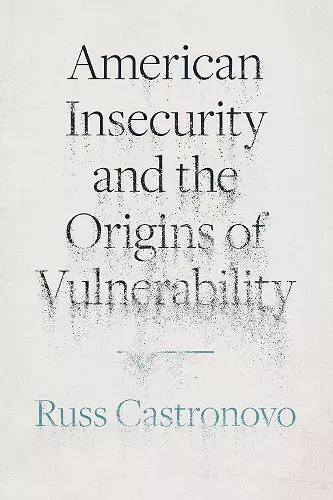American Insecurity and the Origins of Vulnerability
Format:Paperback
Publisher:Princeton University Press
Published:26th Sep '23
Currently unavailable, and unfortunately no date known when it will be back
This paperback is available in another edition too:
- Hardback£80.00(9780691249841)

An incisive critique that examines the origins of contemporary American ideas about surveillance, terrorism, and white supremacy
For more than three centuries, Americans have pursued strategies of security that routinely make them feel vulnerable, unsafe, and insecure. American Insecurity and the Origins of Vulnerability probes this paradox by examining American attachments to the terror of the sublime, the fear of uncertainty, and the anxieties produced by unending racial threat.
Challenging conventional approaches that leave questions of security to policy experts, Russ Castronovo turns to literature, philosophy, and political theory to show how security provides an organizing principle for collective life in ways that both enhance freedom and limit it. His incisive critique ranges from frontier violence and white racial anxiety to insurgent Black print culture and other forms of early American terror, uncovering the hidden logic of insecurity that structures modern approaches to national defense, counterterrorism, cybersecurity, surveillance, and privacy. Drawing on examples from fiction, journalism, tracts, and pamphlets, Castronovo uncovers the deep affective attachments that Americans have had since the founding to the sources of fear and insecurity that make them feel unsafe.
Timely and urgent, American Insecurity and the Origins of Vulnerability sheds critical light on how and why the fundamental political desire for security promotes unease alongside assurance and fixates on risk and danger while clamoring for safety.
"[Castronovo] has written several books in which he examines political issues through the lens of literature, philosophy, and history. In the present volume he uses similar rigor to probe the complex problems associated with national security . . . [Castronovo's] application of disparate literary sources, among whom he numbers Kant, Burke, Locke, and Schiller, as well as Gothic novelists and other writers of fiction (Melville, Fenimore Cooper, etc.), is only one of the innovations in the book's approach." * Choice *
ISBN: 9780691249858
Dimensions: unknown
Weight: unknown
304 pages